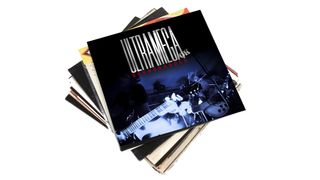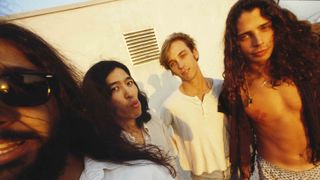Chris Cornell on Ultramega OK’s essential reissue, new Soundgarden album and Audioslave reunion
Iconic frontman reveals why debut was “one of the hardest moments of my career”

Ultramega today
When Soundgarden released their debut album, Ultramega OK, in 1988, it was with mixed emotions.
On one hand, the Seattle upstarts - which comprised frontman/guitarist Chris Cornell, guitarist Kim Thayil, drummer Matt Cameron and then-bassist Hiro Yamamoto - had landed a deal with their dream label, SST Records; on the other, the producer SST had recommended, Drew Canulette, didn’t quite understand what to do with the band’s groundbreaking combination of ’70s rock swagger, indie attitude and punk vitality.
The resultant album showcased a heavy, uncompromising brand of alt-rock obscured behind layers of reverb. Nonetheless, critics and fans alike were able to unearth the raw songwriting gold beneath, and the record ended up receiving a nomination for Best Metal Performance at the 1990 Grammy Awards, while propelling the band to a major-label deal with A&M for 1989’s Louder Than Love.
Nonetheless, Ultramega OK’s production remained a chink in the Soundgarden catalogue’s armour. It was something the band sought to rectify immediately following its release, but a remix was sidelined as Seattle - and the band with it - exploded.

Now, Ultramega OK finally receives the reissue treatment it deserves, with Seattle production legend Jack Endino at the helm, and the addition of six early demos that arguably surpass the album versions.
Chris Cornell was on hand to take us through this early period of the band, and was in high spirits, despite citing the record’s original release as one of the most difficult moments of his career. Nonetheless, the frontman was keen to discuss the album’s place in Soundgarden’s history, as well as what’s next for the band and his recently resurfaced supergroup, Audioslave…
The Ultramega OK reissue has been a long time coming - why now?
“That’s a good question. I think it was just a matter of reissuing a bunch of other stuff and trying to figure out exactly what we wanted to do with this one, ’cause there was more involved.
“First of all, with it originally coming out on SST, we had the license after seven years, so we owned the master for a long time, and felt like it was kind of doing fine just where it was. And we knew at some point we would probably want to re-release it, and we talked about Sub Pop, and everyone agreed right away - it seemed like it would be nice to keep all of our indie stuff at the same home, and they’re all friends of ours.
It was one of the hardest moments of my career in terms of something going wrong at a bad time
“We also really wanted to remix it, because that was an issue right from the very beginning. Of all the albums that we put out, that one was the one that we felt like we wanted to do-over in mixing. [laughs]
“I remember coming home after mixing it - we recorded it and mixed it in Oregon - and I was pretty happy with it. And I A/Bed it to the demos of that record that we had recorded with Jack Endino, song for song, and that was one of the hardest moments of my career in terms of something going wrong at a bad time. That was, for me, the most crucial thing, because we’d put a lot into the album, and it was a lot of the earliest history of Soundgarden.
“And so, that was it. We just finally found a window where we had time to remix it effectively, and remaster it and put it out there.”
Don't Miss
Chris Cornell talks Johnny Cash, Audioslave reunion and Higher Truth

Down with SST
When you were putting that record together, what was the band’s songwriting dynamic like?
“Well, it was unusual in that Screaming Life - which is our first EP on Sub Pop - was new material, and what happened was as we were doing demos, Bruce Pavitt from Sub Pop really reacted to a handful of songs we’d just recorded. Those were our latest songs, and those ended up being on Screaming Life.
“And yet we had this huge backlog of material, and as soon as Screaming Life came out, it did really well critically, and we started getting quite a bit of attention and people coming to Seattle, which had never happened before. We knew we wanted to put out another indie album, but suddenly it was crucial that we just keep going.
“We’d always wanted to put out a record on SST, so we did a deal with them, and we had all this material that was a little bit older than what was on Screaming Life. So, I think we wrote a couple of new things, and then cherry-picked from the songs that we’d been working on for a couple of years, because we’d been a band for four years by then.
“And so we just went back and picked the material. We hadn’t yet had the concentrated writing period for an album. I think it was Louder Than Love, the first time that happened, where you’re writing for an album and it’s all new and you have to have it ready. [laughs]”
Jack Endino has done a fantastic job on the remix, and it really highlights just how broad the band’s influences were back then; did you have a particular vision for the record?
“By then, we had very clear perspectives on what we wanted to sound like, and all it was was just finding subtle improvements on that, and that’s why I think it’s so crucial that Jack remixed it.
“I wasn’t sure in the recording of it that remixing it would really help anything, but then Jack did a remix of Flower years and years ago, just to see, because we were trying to figure out what it was we weren’t sure about. We knew that recording with Jack got us sounding the way we sounded - the way we felt we as a group sounded, the way we sounded in a room. So he did a remix years ago as a test, and it just sounded like anything else we did, so we knew [the original recording] wasn’t bad.
It was our triumph in being able to put out a record on SST, and just be the band we were, which was probably more unique at the time than we even realised
“Other than that, I think it was just our triumph in being able to put out a record on SST, and just be the band we were, which was probably more unique at the time than we even realised.
“The goal had always been that: most of our favourite bands at the time had been releasing at least one album on SST. It was at the centre of great indie at the time. There were a few really great indie labels that you could count on to put out really cool records, or introduce you to cool bands: SST was probably our favourite.
“And so to be able to put out Ultramega OK on SST and be part of that, that to us was the ultimate success, like a popstar being on The Voice now. [laughs]
“And to me, it was entirely on-your-own-terms success; it wasn’t the way a lot of music success is now or has been. Now, you have to make concessions, you have to do what you’re told. We were really lucky, coming into a time where you can do that, in the way that hip-hop did as well. And putting a record out on SST was that; it was the ultimate triumph.”
How would you describe yourself as a guitar player at that time?
“I was a novice at that time, really. I didn’t start playing guitar in earnest until then, and it was really to contribute songs or ideas to Soundgarden.
“And unlike a lot of bands, I didn’t get any resistance; I got a lot of encouragement. I’d come into the room and start playing the part, and if Kim liked it, for example - who’s the guitar player, who would be the first one to be pissed off that someone else is pushing in on his territory - he would really respond positively to it, and it would become a song. So, that was sort of the beginning of me becoming a guitar player on that album.”
That said, you and Kim were ahead of the curve with drop D tuning on the likes of Flower and Beyond The Wheel; did finding that tuning shape the direction of the record?
“I think it did; I think it shaped the direction of the band, probably starting a year-and-a-half earlier. Kim brought that idea in, and it just changed the band tonally.
“The first year of the band was very quirky, post-punk, odd time signatures but melodic music, and heavy rock kind of seeped in there. And I think that’s when we found out what our real identity was, which was to fit somewhere in between what was happening immediately there and mixing that with aspects of rock music from the ’70s that, up to that moment, for the last several years, had been considered super-uncool. [laughs]
“And somehow we had the guts to bring that into what we were doing, but mixing it with influences that had never been done before, and that created something new. It was interesting, the reaction, because it was mostly positive, but when it was negative, it was extremely negative. And that’s when I knew we were doing everything right.”

Future pursuits
Jack has done an incredible job with your early material; any chance he’ll be involved with the new Soundgarden album?
“He’s always on our list. I don’t remember a time when his name wouldn’t come out there in terms of recording or production.
“I think with Soundgarden, the idea of a producer has always been a little bit abstract, because we really started using producers mostly when we were making major-label albums. It was a big investment by the label, but we’d just make friends with them, and then we would never do anything they said - we’d never include any of their ideas. And they were in a position really of just being an engineer and that was it. And there was mostly a role of engineer when it came to producers pretty much straight through our entire career.
We have four people with a pretty good idea of what the band should sound like, and between us all, with our input, we get what we need to get
“So, really, I think, for me, a lot of it comes down to, ‘Who’s going to make it sound the way we want to sound’, not ‘who’s going to be included in any other choice’, for example song choices, song arrangements, song edits - things that producers do.
“Not only do we not need that, but I think it’s a really bad idea. I think that we have four people with a pretty good idea of what the band should sound like, and between us all, with our input, we get what we need to get.”
So it’s safe to say there’s no producer lined up for the new album yet?
“Not really - I don’t think we’ve had that discussion yet. I imagine it might be similar to what we did on King Animal, but it’s hard to say. Again, I’m not sure that’s such a crucial part of our album-making.
Nothing really sounds like anything we’ve done before, and there’s definitely new territory, but it definitely sounds like us
“I think one of the reasons why [King Animal producer] Adam Kasper worked so well is because he’s a really great engineer that captures a very realistic tone, and I like the way it sounds. And he doesn’t get too involved in aspects of Soundgarden being Soundgarden, that producers can kind of get in trouble in.
“So, when I think about producers, nobody really comes to mind. I think that a mostly self-produced album is going to be the best Soundgarden album.”
How’s the new material shaping up?
“We have a lot of interesting songs - sort of similar in that nothing really sounds like anything we’ve done before, and there’s definitely new territory, but it definitely sounds like us. That’s what I’m doing today, as soon as we hang up.”
Last time we spoke, you said you’d “always be open” to an Audioslave reunion, and that time finally came at Prophets Of Rage’s anti-inaugural ball last month; what was it like to be back on stage with those guys?
“It was pretty fun. It was interesting because the dynamic for that band was really just there. I don’t know how much those guys rehearsed the songs, but I had the same experience when I went on stage with Tom [Morello] a couple of years back: where we walked into the room for a rehearsal, and we didn’t even really need one. We just counted the songs in and they were totally where we left them 10 years ago when we’d just got off the road.
“Now, that’s pretty crazy - all the energy and everyone remembering everything, and you’re already playing the song with feeling, as opposed to trying to find it and remember where it is, so it was pretty great, and the energy was good.
“And I think the event was great; it was bittersweet, because there’s an awful lot of emotional fallout and anger from the most recent election, and I think that a lot of people don’t really know what to do with that energy, and I think that’s something positive to do with it. Everyone that was there seemed to feel like they were somewhere that was vital and somewhere with like-minded people doing something positive.”
Can we expect more performances from Audioslave in the future?
“It’s always a possibility. I mean, we’ve been talking about it for at least three or four years now. We were talking about actually picking dates, and it just ended up not working out because everybody’s so busy.
“They have another band again, they all have separate bands that they do themselves, I have Soundgarden and a solo career that’s taking up a lot of time, and I just did Temple Of The Dog. So, it’s really honestly as simple as we end up having a window of time where it’s comfortable for everybody and we want to do it, because I definitely feel like everybody’s up for it.”
The remixed and expanded reissue of Ultramega OK is out on 10 March via Sub Pop.
Don't Miss
Chris Cornell talks Johnny Cash, Audioslave reunion and Higher Truth

Mike is Editor-in-Chief of GuitarWorld.com, in addition to being an offset fiend and recovering pedal addict. He has a master's degree in journalism, and has spent the past decade writing and editing for guitar publications including MusicRadar, Total Guitar and Guitarist, as well as a decade-and-a-half performing in bands of variable genre (and quality). In his free time, you'll find him making progressive instrumental rock under the nom de plume Maebe.

"It may have bothered him that people didn’t recognise his guitar virtuosity, which might be why the song devotes so much space to his shredding": A music professor breaks down the theory behind Prince's When Doves Cry

“It didn’t even represent what we were doing. Even the guitar solo has no business being in that song”: Gwen Stefani on the No Doubt song that “changed everything” after it became their biggest hit

"It may have bothered him that people didn’t recognise his guitar virtuosity, which might be why the song devotes so much space to his shredding": A music professor breaks down the theory behind Prince's When Doves Cry

“It didn’t even represent what we were doing. Even the guitar solo has no business being in that song”: Gwen Stefani on the No Doubt song that “changed everything” after it became their biggest hit
Most Popular








